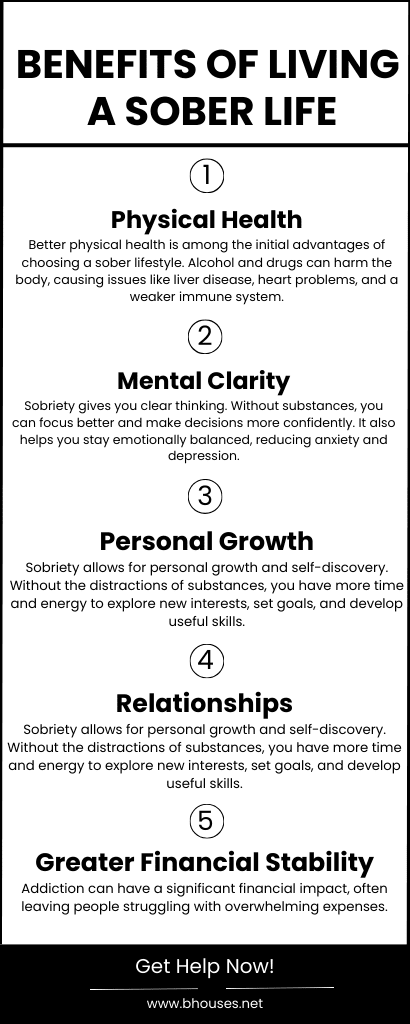In today’s busy world, more people are focusing on the benefits of living a sober life. As around 14.1 million adults in the U.S. struggle with Alcohol Use Disorder (AUD), the rise of the sober living movement is notable. Sobriety isn’t just about avoiding alcohol or drugs—it’s about taking control, finding purpose, and living a meaningful life.
This blog will explore why living a sober and meaningful life is key to lasting happiness. We’ll cover five important strategies to help you stay sober and live a life full of purpose and joy.
What Does a Sober Life Look Like?
Living a sober life means more than just avoiding alcohol or drugs. It’s about choosing a lifestyle that prioritizes mental, emotional, and physical well-being. A sober life involves avoiding mind-altering substances and focusing on habits and activities that support a healthy, balanced, and meaningful life.
Daily Life
In a sober life, daily experiences are marked by clarity and purpose. Without the influence of substances, a person can fully enjoy their activities, whether spending time with loved ones, pursuing hobbies, or doing well at work. They focus on self-awareness and make choices that reflect their values and goals.
Misconceptions
A common misconception about living a sober life is that it’s boring or limiting. Some worry that sobriety means missing out on fun or social events. However, many who choose sobriety find their lives more fulfilling. Without substances, they can explore new interests, strengthen relationships, and find a sense of purpose that addiction once overshadowed.
Benefits of Living a Sober Life
Living a sober life enhances physical health, mental clarity, relationships, and personal growth, creating a strong foundation for a fulfilling and meaningful existence.
Physical Health
Better physical health is among the initial advantages of choosing a sober lifestyle. Alcohol and drugs can harm the body, causing issues like liver disease, heart problems, and a weaker immune system. By staying sober, you allow your body to heal, gain energy, and possibly live longer. With this new energy, you can enjoy physical activities, eat better, and lead a healthier life overall.
Mental Clarity
Sobriety gives you clear thinking. Without substances, you can focus better and make decisions more confidently. It also helps you stay emotionally balanced, reducing anxiety and depression. This mental clarity and emotional stability make it easier to handle life’s challenges with a positive attitude.
Relationships
Living a sober life can greatly improve relationships. Substance abuse often damages trust, causes poor communication, and leads to emotional instability with family, friends, and partners. In sobriety, these relationships can heal and grow stronger. Communication becomes honest, trust is rebuilt, and connections become deeper and more meaningful. Relationships in sobriety are often more real and fulfilling.
Personal Growth
Sobriety allows for personal growth and self-discovery. Without the distractions of substances, you have more time and energy to explore new interests, set goals, and develop useful skills. Sobriety provides the space to reflect on your values and pursue goals that bring lasting fulfillment.
Greater Financial Stability
Addiction can have a significant financial impact, often leaving people struggling with overwhelming expenses. Choosing a sober lifestyle helps lift that financial burden, allowing individuals to take charge of their finances again. The money that was once spent on harmful habits can now be invested in personal development, meaningful experiences, and building a more secure, fulfilling future.

5 Strategies for Living a Meaningful & Sober Life
Living a meaningful and sober life requires finding your ‘why,’ building a supportive network, engaging in purposeful activities, practicing mindfulness and self-care, and setting realistic goals while celebrating progress.
1. Find Your ‘Why’
Having a clear personal reason, or “why,” is essential for living a sober life. This reason, or “why,” maintains your motivation and focus through tough times. Whether it’s for better health, being a better parent, or reaching career goals, knowing your “why” is important.
To find your “why,” think about what led you to choose sobriety. Consider how substance use affected your health, relationships, and happiness. Write down your reasons and review them often, especially when you’re tempted or unsure. Your “why” will steer you through the challenges of maintaining sobriety.
2. Build a Support Network
Having a strong support network is key to staying sober and living a fulfilling life. Being with those who truly support and understand your journey can be very helpful. They offer encouragement, keep you accountable, and give you a sense of belonging.
To build a support network, consider joining sober groups like Alcoholics Anonymous (AA) or other recovery programs. These groups provide a safe space to share, get advice, and connect with others living sober. Also, strengthen relationships with friends and family who support your sobriety. It’s important to avoid people or places that could lead to a relapse.
3. Engage in Meaningful Activities
Living a sober life isn’t just about avoiding substances; it’s about filling your life with activities that bring joy and purpose. Doing meaningful things can keep you focused on sobriety and improve your well-being.
Start by finding hobbies or passions that match your values. Whether it’s volunteering, being creative, or focusing on personal growth, these activities can give you a sense of accomplishment. Meaningful work plays a vital role in sustaining a sober life. Choose a career that fits your strengths and passions, and commit to it fully. When your daily life feels fulfilling, you’re less likely to return to old habits.
4. Practice Mindfulness & Self-Care
Mindfulness and self-care are key to staying sober and improving your quality of life. Mindfulness means staying present, accepting your thoughts and feelings without judgment, and handling life’s challenges calmly and clearly.
Add mindfulness practices like meditation, deep breathing, or journaling to your daily routine to manage stress, reduce anxiety, and stay committed to sobriety. Self-care is just as important; focus on activities that nurture your body, mind, and spirit. This includes regular exercise, a balanced diet, enough sleep, and doing things that bring you joy. Taking care of yourself gives you the strength to stay on your sober journey.
5. Set Realistic Goals & Celebrate Progress
Setting realistic goals is key to living a sober life. Goals give you direction and motivation, helping you stay focused on sobriety and personal growth. It’s important to set achievable goals and match where you are in your recovery.
Start with small, manageable goals that build on your strengths and gradually become more challenging. For example, aim to stay sober for a week, then a month, and so on. Celebrate each milestone, even with simple rewards or self-recognition. Recognizing your progress boosts motivation and helps you keep moving toward your long-term goals.
FAQs
Que: What are the initial steps to take towards living a sober life if I’m battling addiction?
Ans: The first step in your sobriety journey is to acknowledge the problem and seek support. Reach out to a healthcare professional, counselor, or support group like AA for guidance. Building a plan and connecting with a supportive network are key first steps.
Que: Can I still have fun and be social while living sober?
Ans: Living a sober life doesn’t mean missing out on fun or social activities. You can enjoy life by finding new ways to have fun without relying on substances, like attending alcohol-free events, participating in sober activities, and discovering hobbies that bring you joy.
Que: What if I relapse? How do I get back on track?
Ans: Relapse is a common part of the recovery journey and doesn’t mean failure. If you relapse, it’s essential to reach out for support immediately, reflect on the triggers that led to the relapse, and re-commit to your sobriety. Use the experience as a learning opportunity and continue moving forward.
Que: How do I deal with peer pressure in social settings?
Ans: Dealing with peer pressure can be challenging, but having a plan in place helps. Practice assertive communication, know your limits, and have a support person you can rely on during social events. It’s also okay to decline invitations that may jeopardize your sobriety.
Conclusion
Living a sober life is a journey filled with challenges, but the rewards are immense. By finding your ‘why,’ building a support network, engaging in meaningful activities, practicing mindfulness and self-care, and setting realistic goals, you can create a life that is not only sober but also deeply fulfilling.
Remember, every step you take toward sobriety is a step toward a healthier, happier, and more meaningful life. Whether you’re just starting or have been living a sober life for years, these strategies can help you stay on track and continue growing. If you have any questions or need further support, don’t hesitate to reach out and share your experiences. Every step you take towards a fulfilling and sober life is worth the effort.
Ready to live a meaningful and sober life? BHouses is here to support you. Reach out for resources, guidance, and a community to help you succeed. Start today and see how we can assist you on your journey.










